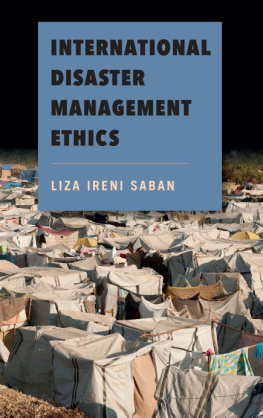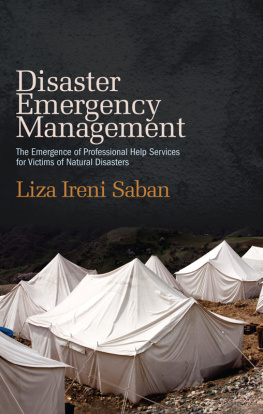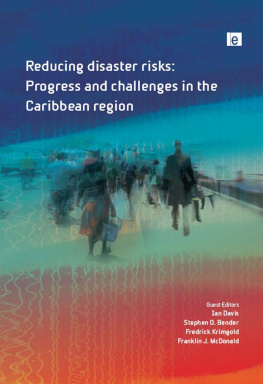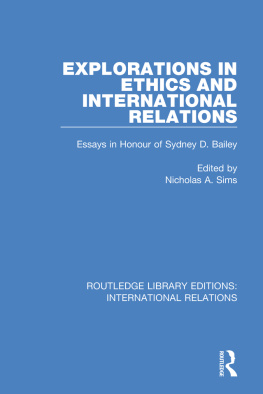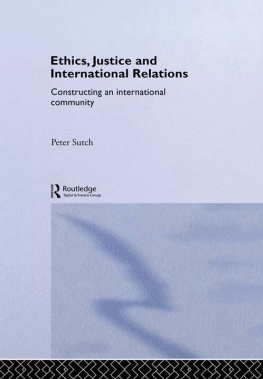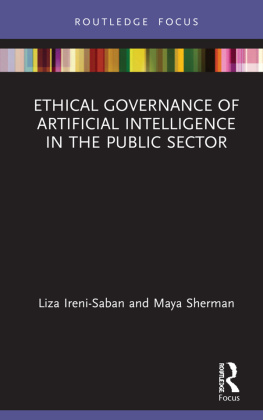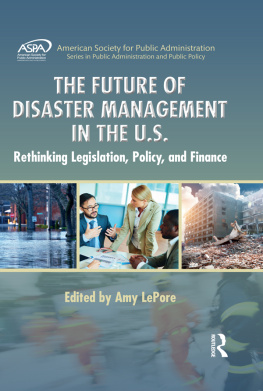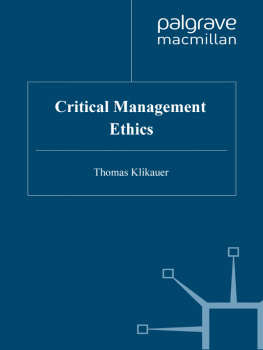Published by State University of New York Press, Albany
2016 State University of New York
All rights reserved
Printed in the United States of America
No part of this book may be used or reproduced in any manner whatsoever without written permission. No part of this book may be stored in a retrieval system or transmitted in any form or by any means including electronic, electrostatic, magnetic tape, mechanical, photocopying, recording, or otherwise without the prior permission in writing of the publisher.
For information, contact State University of New York Press, Albany, NY
www.sunypress.edu
Production, Jenn Bennett
Marketing, Michael Campochiaro
Library of Congress Cataloging-in-Publication Data
Names: Ireni Saban, Liza, author.
Title: International disaster management ethics / Liza Ireni Saban.
Description: Albany : State University of New York Press, 2016. | Includes bibliographical references and index.
Identifiers: LCCN 2015042427 (print) | LCCN 2016011153 (ebook) | ISBN 9781438461717 (hardcover : alk. paper) | ISBN 9781438461724 (e-book)
Subjects: LCSH: Disaster reliefInternational cooperation. | Emergency managementInternational cooperation. | Disaster reliefMoral and ethical aspects.
Classification: LCC HV553 .I5887 2016 (print) | LCC HV553 (ebook) | DDC 174/.936334dc23
LC record available at http://lccn.loc.gov/2015042427
10 9 8 7 6 5 4 3 2 1
Introduction
With the increasing incidence and intensity of natural disasters, the international disaster management community has its hands full. Its time-constrained environment is complex and complicated, involving multiple responsibilities, challenges, and constituencies. International aid actors ability and commitment to meet immediate human need in times of disaster is tested during disaster events as they try to improve on the affected national governments ability to address the needs of the affected population by supplying relief resources and services. Large-scale disasters, often termed international disasters, overwhelm national governments capacities to respond. This follows the UN definition of natural disaster as
The frequency and severity of natural disasters is increasing. During 20002014, 6,084 natural disaster events were registered. The annual average of disaster frequency observed is about 400 natural disasters per year. Natural disasters caused the death of 1,218,296 people, affecting 2,919,832,577 people worldwide. Natural disasters affect both developed and developing countries across the globe; China, the United States, the Philippines, India, and Indonesia are considered the five countries that are most frequently hit by natural disasters.
In these extreme events, response and relief efforts are quickly mobilized by the international disaster management community. The international disaster management community involves a wide range of actors embedded in fluid and complex networks of association. The international disaster management community consists of victims, governments of the affected countries, governments of other countries and their emergency agencies, international organizations, regional organizations, and NGOs. Too often, national governments accuse international relief actors of overlooking the local context in which they operate, and even that their underlying goal is to broaden their agendas and question the priorities and methods of the elite-controlled political processes (Aldrich and Crook 2008). Although international relief organizations may not have a full understanding of the wider socio-economic context in which response and relief actions occur, evidence from various disaster settings points to lack of confidence on the part of international aid organizations regarding the capacity of the affected government to effectively deliver relief aid to its citizens. This mutual distrust turns into greater inconsistency in the disaster policy implementation process, thus failing to manifest effective disaster response (Adams and Balfour 2009, Ink 2006, Jia 2008, Menzel 2006, Mooney 2009, Polman 2010, Yang 2008).
Nonetheless, there is another set of challenges faced by the international disaster management community that is equally implicated in effective disaster management: The potential for disunity, when considering the vast differences in international aid actors values, preferences, and institutional settings.
The international disaster management community is composed of innumerable agencies with different skills, reporting channels, level of responsibility, and ethical cultures. In a disaster management setting, international aid organizations must function in the midst of competing claims about the distribution of resources, conflicting views of the management of personnel, scarcity of appropriate information, and lack of coordination. It seems that Kevin M. Cahills statement that Managing complex humanitarian emergencies, particularly in the midst of conflicts and disasters, is not a field for amateurs (Cahill 2013, 385) is truer than ever.
Viewed in this way, universalizing professional and ethical obligations through a process of codification may help to build trust with the disaster-affected government and tackle the unintended consequences of immediate short-term international response for people affected by natural disasters. Studies have shown that in the face of a disaster event, effective coordination compensates for scarce resources and uncertainty (Comfort and Haase 2006, Comfort, Ko, and Zagorecki 2006, Coppola 2011, Drabek 2003, Kapucu 2006, 2008, Kapucu, Arslan, and Collins 2010, Kapucu, Augustin, and Garayev 2009, Kobila, Meek, and Zia 2010, McEntire 2002, Mitchell 2006, Moynihan 2012, Nolte, Martin, and Boenigk 2012, Vasavada 2013). Professionalism through the process of codification in international disaster management then acts to establish the rules, norms, and assumptions that shape the distribution of aid resources by the overall international aid community. Professionalism provides controls that regulate how international aid actors manage ambiguity and ethical dilemmas.
A strategy for universalizing professional understandings of ethics in international disaster management is designed to clarify and identify international disaster management professions across a range of organizational and national contexts. Clearly, consideration of ethics in making international disaster management professional must ensure that this institution is just. During and after a disaster event, the international disaster management community is faced with ethical dilemmas regarding appropriate and fair allocation of relief and response resources and services. While it is desirable for the management regime to promote immediate and efficient distribution of response and relief resources, long-term distributional consequences often go unrecognized within the overwhelming, time-constrained environment created by disaster events. The fact that the international disaster management community intervenes in distributional decision making with varying degrees of legitimacy and political will, leads to having special responsibilities to maintain the highest ethical standards in its role as enabler, coordinator, and facilitator to meet human need in times of disaster. It is suggested then that humanitarian aid and relief organizations are not morally neutral agents judged on their effectiveness or reduction of disaster vulnerabilities, but rather moral agents that serve cosmopolitan values, and are concerned with justification of the ends and means by which those values are enacted. This is the basis of the international disaster management communitys claim to moral legitimacy in governance.


